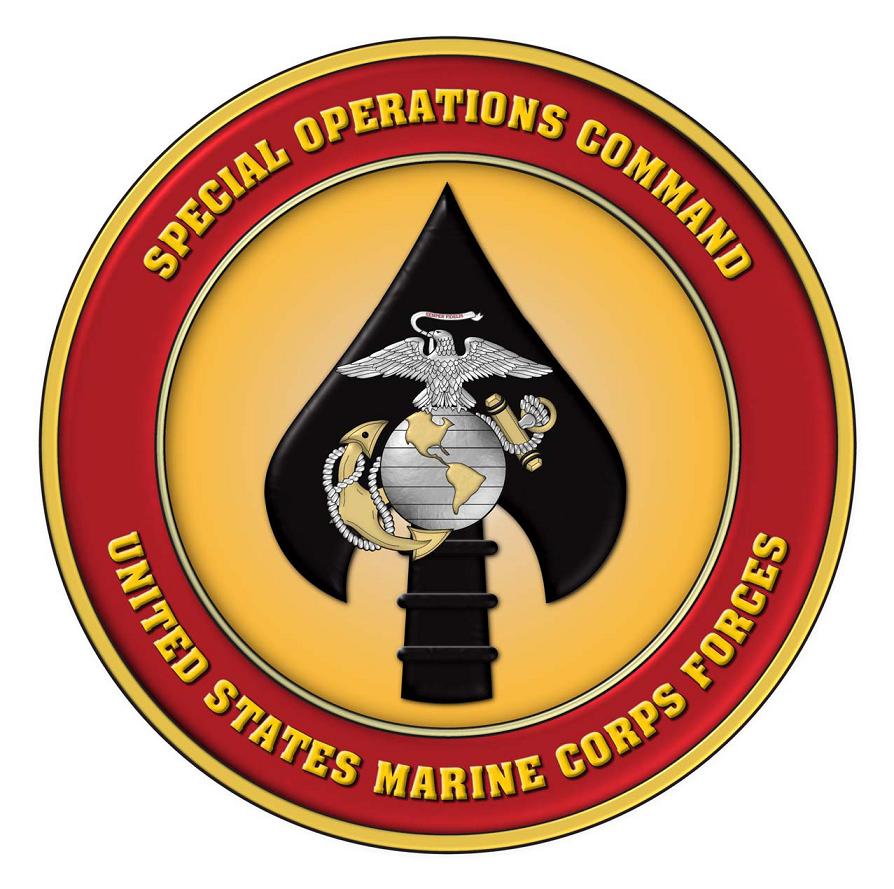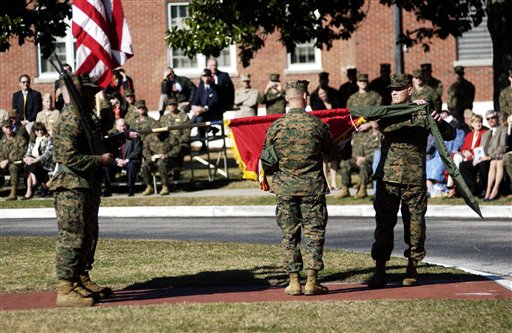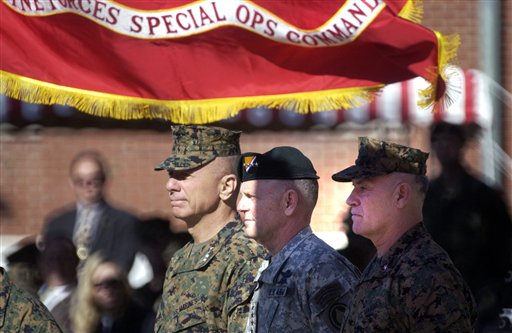2006년 2월 24일, 미국 해병대 특수전사령부(US MARSOC) 창설
KCX | 2006-02-26 10:04:07
조회 7081 | 추천 0 | 다운로드 9
드디어 미 해병대의 정예 특수부대원들도 US SOCOM에 합류했습니다.
2월 24일 미 해병대 특수전사령부(United States MARine Special Operations Command)가 창설됨과 동시에 2,600여명의 정예 미 해병대 병력이 미 통합 특수전사령부(US SOCOM)에 예속되었습니다.
초대 미 해병대 특수전사령관은 Dennis Hejlik 준장이 임명되었으며 이날 창설식에는 Hejlik 준장 외에도 미 통합 특수전사령관 Bryan Brown 대장과 미 해병대사령관 Micheal Hagee 대장도 참석하였습니다.
미 해병대 특수전사령부는 제 2해병원정군의 주둔지인 Camp Lejeune에 본부를 두고 활동하게 되며 2,600명의 병력으로 구성됨과 동시에 2개 대대(총 3개 대대)가 항시 즉응태세를 갖추도록 대기할 예정입니다.
한편 기존 해병 특수부대인 MSFP, FAST, Force Recon등은 MARSOC의 통제대상에서 제외됩니다.
다음은 그 전문이고 첨부사진들은 미 해병 특수전사령부의 마크와 사령부 창설식입니다.
(해석은 바쁜 관계로 생략...)
CAMP LEJEUNE, N.C. - The Marine Corps formally entered the world of military special operations Friday by establishing a separate command devoted to small-unit tactics and stealthy reconnaissance.
It's work they've done as far back as World War II, but never before as part of the U.S. Special Operations Command. The change means battalions of Marines will be focused on special ops work just as Navy SEALs and Army Green Berets and Rangers are.
Defense Secretary Donald Rumsfeld made the change official after arriving at Camp Lejeune aboard an Osprey tiltrotor aircraft. He said special ops Marines will help "seek new and innovative ways to take the fight to the enemy."
Demand for highly trained special operations forces has increased as the U.S. war against terrorists continues.
"We face a ruthless enemy that lurks in shadows," Rumsfeld said. "It has become vital the Department of Defense and armed forces arrange ourselves in new and unconventional ways to succeed in meeting the peril of our age."
The Marines plan to establish their first special operations company in May and have the command fully staffed with about 2,500 troops by 2010. The command will recruit corporals, sergeants and officers with reconnaissance experience and language training.
As part of the change, the Marine anti-terrorism brigade headquartered at Lejeune will go out of business and shift some of its troops to the special operations command. The command will have combat battalions on both U.S. coasts, along with support units and schools to teach special operations skills to U.S. and foreign troops.
Units to train foreign military officers will deploy within months, Marine Commandant Gen. Michael Hagee said. A special operations company will deploy with an expeditionary unit aboard ships by the end of the year, other military officials said.
The Tampa, Fla.-based U.S. Special Operations Command will control the Marines' special forces.
Special operations will give the Marines "a role they otherwise would not be able to get, to do counterterrorism," said military analyst John Pike of Washington-based Globalsecurity.org.
"The struggle against evil doers is a growth industry and the Marines want a piece of that," Pike said. "The special operations community is getting a lot larger and they need more people."
2월 24일 미 해병대 특수전사령부(United States MARine Special Operations Command)가 창설됨과 동시에 2,600여명의 정예 미 해병대 병력이 미 통합 특수전사령부(US SOCOM)에 예속되었습니다.
초대 미 해병대 특수전사령관은 Dennis Hejlik 준장이 임명되었으며 이날 창설식에는 Hejlik 준장 외에도 미 통합 특수전사령관 Bryan Brown 대장과 미 해병대사령관 Micheal Hagee 대장도 참석하였습니다.
미 해병대 특수전사령부는 제 2해병원정군의 주둔지인 Camp Lejeune에 본부를 두고 활동하게 되며 2,600명의 병력으로 구성됨과 동시에 2개 대대(총 3개 대대)가 항시 즉응태세를 갖추도록 대기할 예정입니다.
한편 기존 해병 특수부대인 MSFP, FAST, Force Recon등은 MARSOC의 통제대상에서 제외됩니다.
다음은 그 전문이고 첨부사진들은 미 해병 특수전사령부의 마크와 사령부 창설식입니다.
(해석은 바쁜 관계로 생략...)
CAMP LEJEUNE, N.C. - The Marine Corps formally entered the world of military special operations Friday by establishing a separate command devoted to small-unit tactics and stealthy reconnaissance.
It's work they've done as far back as World War II, but never before as part of the U.S. Special Operations Command. The change means battalions of Marines will be focused on special ops work just as Navy SEALs and Army Green Berets and Rangers are.
Defense Secretary Donald Rumsfeld made the change official after arriving at Camp Lejeune aboard an Osprey tiltrotor aircraft. He said special ops Marines will help "seek new and innovative ways to take the fight to the enemy."
Demand for highly trained special operations forces has increased as the U.S. war against terrorists continues.
"We face a ruthless enemy that lurks in shadows," Rumsfeld said. "It has become vital the Department of Defense and armed forces arrange ourselves in new and unconventional ways to succeed in meeting the peril of our age."
The Marines plan to establish their first special operations company in May and have the command fully staffed with about 2,500 troops by 2010. The command will recruit corporals, sergeants and officers with reconnaissance experience and language training.
As part of the change, the Marine anti-terrorism brigade headquartered at Lejeune will go out of business and shift some of its troops to the special operations command. The command will have combat battalions on both U.S. coasts, along with support units and schools to teach special operations skills to U.S. and foreign troops.
Units to train foreign military officers will deploy within months, Marine Commandant Gen. Michael Hagee said. A special operations company will deploy with an expeditionary unit aboard ships by the end of the year, other military officials said.
The Tampa, Fla.-based U.S. Special Operations Command will control the Marines' special forces.
Special operations will give the Marines "a role they otherwise would not be able to get, to do counterterrorism," said military analyst John Pike of Washington-based Globalsecurity.org.
"The struggle against evil doers is a growth industry and the Marines want a piece of that," Pike said. "The special operations community is getting a lot larger and they need more people."








 1
1


댓글 [1]
우꼬 | 2006-02-26 | 추천 0